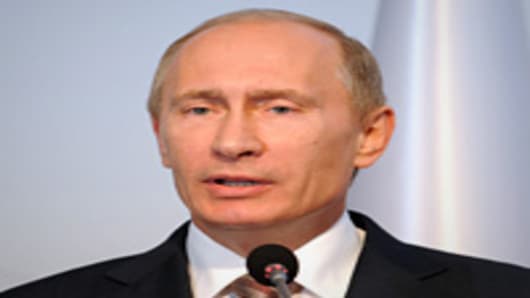When Vladimir Putin took time out from shirtless photo opportunities to announce that he was seeking the Russian presidency again in 2012 at the weekend, the subsequent drop in the rouble must have been rather unflattering.
Markets seem to believe
that his return to the presidency, with Medvedev probably moved to the office of Prime Minister, will have a negative effect on the Russian economy, particularly after the high-profile departure of finance minister Alexei Kudrin after a dramatic television debate Monday night.
Kudrin, who spent 11 years as finance minister, is widely credited with steering the Russian economy so that it remained relatively unaffected by the crisis of 2008, despite a plunge in the price of oil and gas, the bedrocks of Russian post-Communist economic success.
"Even those directors of oil and gas companies (who were taxed more heavily under Kudrin) acknowledge that without him, the 2008 crisis would have set Russia back 5 years," Liam Halligan, chief economist at Prosperity Capital Management, which says it is the largest foreign portfolio investor in Russia, told CNBC Tuesday.
"Kudrin is probably the most respected objectively finance minister around the world at this point."
Kudrin could, of course, be manoeuvring his way into another job further down the line.
"He is now moving from the shadows of the technocrats into the national light, and this is his first move in what will be a protracted episode," said Halligan, who believes that Kudrin will be in the next government.
"We are now seeing the most prudent politician in the government, who has many people behind him including Putin, saying to Medvedev: 'We have this money, we have an oil price averaging over $110 this year, and we should continue to maintain our policies.'"
Medvedev has attempted to raise government spending on, among other things, the military, as he is keen to end conscription, while Kudrin has pushed for a more cautious approach.
"The President can see that he's going to be Prime Minister when the difficult decisions have to be taken. He's being manoevered and he doesn't like it," said Halligan.
If Putin succeeds at both next year's elections and the succeeding election, as looks likely given his popularity levels, he could be in charge for 20 years in total – longer than any Russian leader since the revolution, apart from dictator Stalin.
"It would now be a major surprise if Putin were not to return to the Kremlin next year," Neil Shearing, chief emerging markets economist at Capital Economics, wrote in a note.
"With economic reform contingent on political reform, the return of President Putin may not bode well for Russia’s long-run growth prospects," he warned.
Changing Russian Economy
The Russian consumer has become a much more important part of the economy as GDP per capita – and spending – have soared since the Soviet era.
The average Russian now spends 70 percent more on durable goods and 25 percent more on food, plus twice as much in alcohol, cigarettes, cars and clothing, than during the Soviet period, according to a research note by Tania Sollogoub, senior economist at Credit Agricole. GDP of $16,840 per capita, according to the International Monetary Fund, is the highest in the BRICS countries.
"The federal government is supporting Russian household income, particularly for pensioners," said Sollogoub.
"But this is deepening the non-oil budget deficit, and the government accounts are increasingly vulnerable to a downturn in energy prices. The same logic applies to the external accounts, which require high oil prices to remain in balance."
"This growth model, in which the State plays an important role, runs the risk of leading to a new cycle of government debt, especially if the oil price falls," she warned.
"It should therefore be relayed by investment and by diversification of the economy — which cannot be achieved without structural reforms and improved governance."
At a time when the world is in economic turmoil, with unrest in the Middle East and even in previously stable democracies in Europe, significant changes at the very top of the global food chain could be afoot.
Three out of the G8 nations: France, the United States and Russia, could change their leadership after elections in 2012. Four out of the five permanent members of the UN Security Council – the three G8 countries mentioned previously, plus China – are either changing the man at the top of their government or undergoing elections which could oust the current leaders.
The concern following Putin's announcement comes despite widely-held opinion when Medvedev was elected that he was a mere puppet. Putin held off running for a third term because he is prevented from doing so under Russian law.
Under Medvedev, the Russian government has promised a number of measures to crack down on corruption and lessen the economy's dependency on the oil price.
"For all Mr. Medvedev’s warm words on the need to progress market reforms, Mr. Kudrin has arguably been more influential in rebuilding Russia’s balance sheet from the ashes of the 1998 rouble crisis," said Shearing.
"Putin is widely seen as having been the senior partner within the ruling “tandem” over the past four years. In this sense, his return to the Kremlin shouldn’t alter the status quo."
Former KGB officer Putin also passed several key measures which have helped modernize the Russian economy while he was in power, including the establishment of a 13 percent flat rate of income tax.
"There's a view in the Western world that Medvedev is the good guy and Putin is the bad guy. That's deeply simplistic, almost vaudeville economic analysis," said Halligan.
"He really is a very popular politician and he is the guy most people want to be the president."
"What we have here is a very natural evolution in the pupil/master relationship," he said of the Putin/Medvedev move.
"Isn't it good that we are seeing it out in the open? Doesn’t that show how far this country has come?"



